#retrieve from org
Explore tagged Tumblr posts
Text
SFDX commands (continued..)
Creating a salesforce project sfdx force:project:create --projectname "projectName" --manifest Setting the api version sfdx config:set apiVersion=55.0 Authenticating the sandbox/developer org. #For Sandbox orgs: sfdx force:auth:web:login -a "sandboxName" -r https://test.salesforce.com #For dev/Production/scratch orgs: sfdx force:auth:web:login -a "sandboxName" -r…
View On WordPress
#deploy to org#retrieve from org#retrieve objects from org#Salesforce#salesforce apex#salesforce authentication#vscode
0 notes
Note
This npr dot org article made me think of your post on organ donation
/sections/shots-health-news/2024/10/16/nx-s1-5113976/organ-transplantion-mistake-brain-dead-surgery-still-alive
WACK.
“He was moving around — kind of thrashing. Like, moving, thrashing around on the bed,” Miller told NPR in an interview. “And then when we went over there, you could see he had tears coming down. He was crying visibly.” The donor’s condition alarmed everyone in the operating room at Baptist Health hospital in Richmond, Ky., including the two doctors, who refused to participate in the organ retrieval, she says. “The procuring surgeon, he was like, ‘I’m out of it. I don’t want to have anything to do with it,’ ” Miller says. “It was very chaotic. Everyone was just very upset.” Miller says she overheard the case coordinator at the hospital for her employer, Kentucky Organ Donor Affiliates (KODA), call her supervisor for advice. “So the coordinator calls the supervisor at the time. And she was saying that he was telling her that she needed to ‘find another doctor to do it’ – that, ‘We were going to do this case. She needs to find someone else,’ ” Miller says. “And she’s like, ‘There is no one else.’ She’s crying — the coordinator — because she’s getting yelled at.”
"Mistake averted" you have a supervisor who heard these facts and demanded to proceed. "Mistake"
30 notes
·
View notes
Text
hey remember the so-called "JB depersonalization" concept dump. apparently I wrote the Q POV/side of things too. it cuts off rather abruptly 8V but well, here is what I found in my notes app:
# Q's pov depersonalization
Bond is on a mission, makes contact with the mark, starts the process of negotiating an in, etc.
But then he disappears. Snatched off the streets? Maybe he gets a restaurant rec and walks there and that's how? Or taken from hotel room? kind of torn on how it happens
Maybe it's not even obvious at first- mission seems to be progressing as normal, no obvious pings or signs. But then Bond fails to do a check-in. Maybe M is like well, he does that. Or maybe Q even is like that at first. Except it's all very weird bc there's no obvious reason why Bond would have gone dark. All of his stuff is left at the hotel and it seems like he's just gone. Maybe it even takes a bit of digging before they find definite proof that he was taken vs went rogue.
Some other agent sent in to investigate after a couple of days? ….the hotel would probably not just leave the room… unless maybe do not disturb sign was hung up and that's why. Okay so some other agent sent in the investigate, find all of his stuff just left there except what he had on him obv. Q realizes the mark also dropped off radar, something strange going on. Finally finds some oblique cctv that hints Bond might have been snatched? but otherwise no other obvious trail
they try to investigate, keep investigating whatever organization Bond was sent to find cuz that seems like the obvious culprit- but trails are hard to find and/or keep going cold. eventually MI6 has to reprioritize resources and put Bond down as MIA, but Q keeps running his own searches in the bg/on his own time
Finally, several months later (kind of torn on the timing cuz I think it needs to take a while for Bond's end to work out, but also Bond being gone for *too* long doesn't work on the MI6 end… maybe I am overthinking this, maybe I don't need to try to science it, lol, maybe I can just Indiana Jones it and they got a *handwaves thing that makes actual brainwashing real), Q stumbles on maybe something, and decides to hare off himself to like preliminarily check it out before he brings it to M
which ofc, also gets himself snatched
and brought to *gestures wherever the org has their operations, or at least where the part Bond is at, is
so picture this: Q is probably roughed up and restrained, and they throw him into a room/lab/cell/chamber/something. the villain group's leader or branch head or whatever guy is grandstanding at him as they do, Q is probably mouthing off back,
Do they know who he is? Do they know who Bond is? Fun if yes but they don't care lmao, it's not politically motivated it's ideological, but also somewhat convenience.
hm okay, so they know Q is someone capable, if not important, but also they don't care who he is politically.
Q lets something slip about I came to retrieve my agent or something
Oh, *your* agent? So he means something to you, does he?
--
AND THEN IT CUTS OFF 8V. where was I going with this. I mean I guess he gets thrown in w Bond at that point. Does Bond recognize him? or does he try to attack? Actually he'd be following orders so he wouldn't just blindly attack.
12 notes
·
View notes
Text



realizing I've never posted these here oopsies
a bg3 au where Saphira and Ace are the protags
Saphira - taken from her crèche when she was young by a doctor to "raise her in their tradition". Escaped the abusive containment years later and then got swooped up by the nautiloid. Prioritizes getting cured and her revenge on the doctor.
Ace - part of a criminal org in the undercity of Baldur's Gate, got sent to retrieve a "powerful relic" for them. Got swooped up by the nautiloid with the relic in hand. Prioritizes getting cured and befriending Saphira.
#hc that githyanki have flat chests my beloved#but yea i have a ton of thoughts for this#pokemon reborn#saphira belrose#ace featherstone#bg3#baldur's gate 3#au posting#saphirace bg3 au#bg3 oc#gon draws
34 notes
·
View notes
Text
All the books I reviewed in 2023 (Nonfiction)

Next Tuesday (December 5), I'm at Flyleaf Books in Chapel Hill, NC, with my new solarpunk novel The Lost Cause, which 350.org's Bill McKibben called "The first great YIMBY novel: perceptive, scientifically sound, and extraordinarily hopeful."

It's that time of year again, when I round up all the books I reviewed for my newsletter in the previous year. I posted 21 reviews last year, covering 31 books (there are two series in there!). I also published three books of my own last year (two novels and one nonfiction). A busy year in books!
Every year, these roundups remind me that I did actually manager to get a lot of reading done, even if the list of extremely good books that I didn't read is much longer than the list of books I did read. I read many of these books while doing physiotherapy for my chronic pain, specifically as audiobooks I listened to on my underwater MP3 player while doing my daily laps at the public pool across the street from my house.
After many years of using generic Chinese waterproof MP3s players – whose quality steadily declined over a decade – I gave up and bought a brand-name player, a Shokz Openswim. So far, I have no complaints. Thanks to reader Abbas Halai for recommending this!
https://shokz.com/products/openswim
I load up this gadget with audiobook MP3s bought from Libro.fm, a fantastic, DRM-free alternative to Audible, which is both a monopolist and a prolific wage-thief with a documented history of stealing from writers:
https://pluralistic.net/2022/07/25/can-you-hear-me-now/#acx-ripoff
All right, enough with the process notes, on to the reviews!

NONFICTION
I. The Once and Future Sex by Eleanor Kaneaga
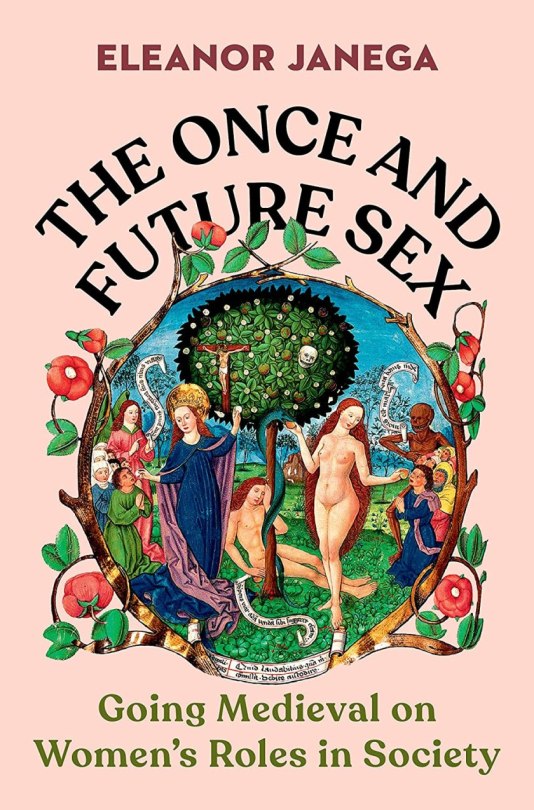
A history of gender and sex in the medieval age, describing the weird and horny ways of medieval Europeans, which are far gnarlier and more complicated than the story we get from "traditionalists" who want us to believe that their ideas about gender roles reflect a fixed part of human nature, and that modern attitudes are an attempt to rewrite history:
https://pluralistic.net/2023/01/17/ren-faire/#going-medieval
II. Pirate Enlightenment by David Graeber
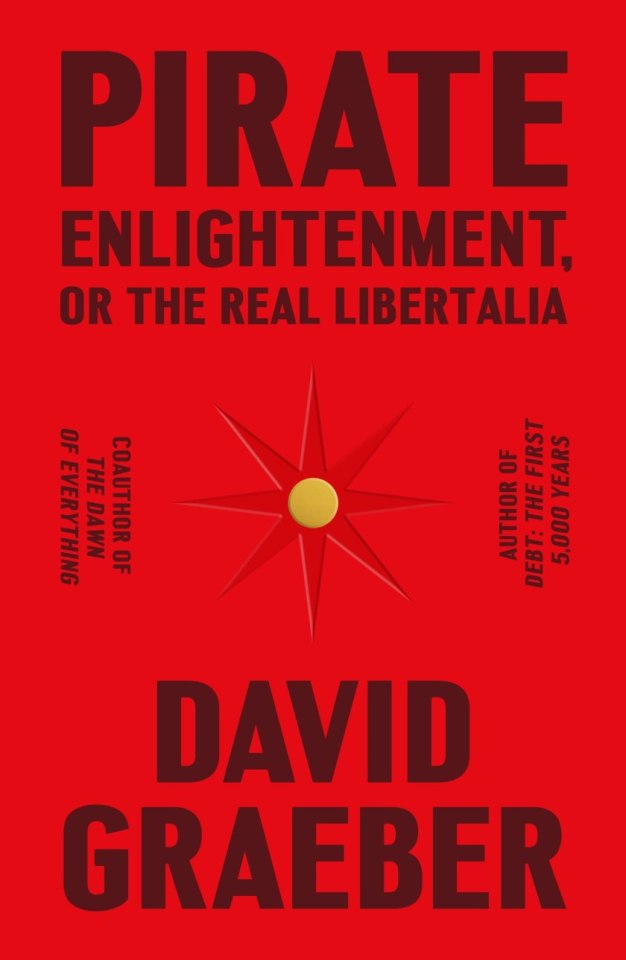
In the early 18th century, the Zana-Malata people – a new culture created jointly by pirates from around the world and Malagasy – came to dominate the island. They brought with them the democratic practices of pirate ships (where captains were elected and served at the pleasure of their crews) and the matriarchal traditions of some Malagasy, creating a feminist, anarchist "Libertalia." Graeber retrieves and orders the history of this Libertalia from oral tradition, primary source documents, and records from around the world. Taken together, it's a tale that is rollicking and romantic, but also hilarious and eminently satisfying.
https://pluralistic.net/2023/01/24/zana-malata/#libertalia
III. A Hacker's Mind by Bruce Schneier
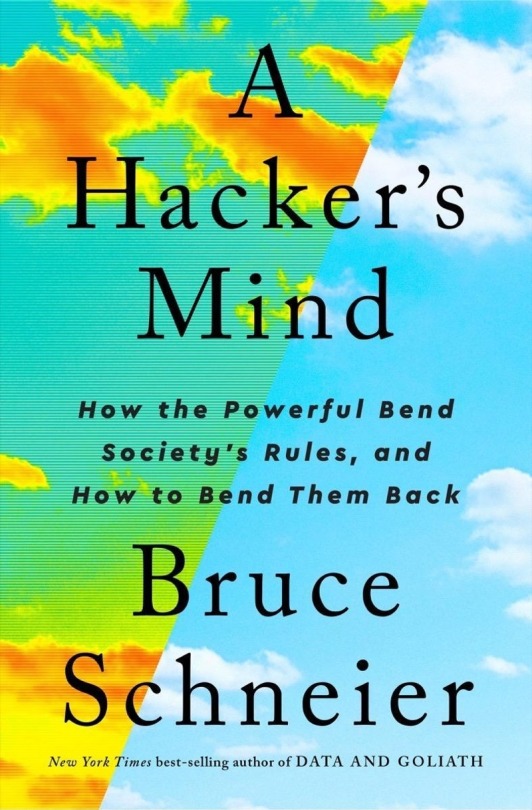
Schneier broadens his frame to consider all of society's rules – its norms, laws and regulations – as a security system, and then considers all the efforts to change those rules through a security lens, framing everything from street protests to tax-cheating as "hacks." This leaves us with two categories: hacks by the powerful to increase their power; and hacks by everyone else to take power away from the powerful.
https://pluralistic.net/2023/02/06/trickster-makes-the-world/#power-play
IV. Responding to the Right by Nathan J Robinson
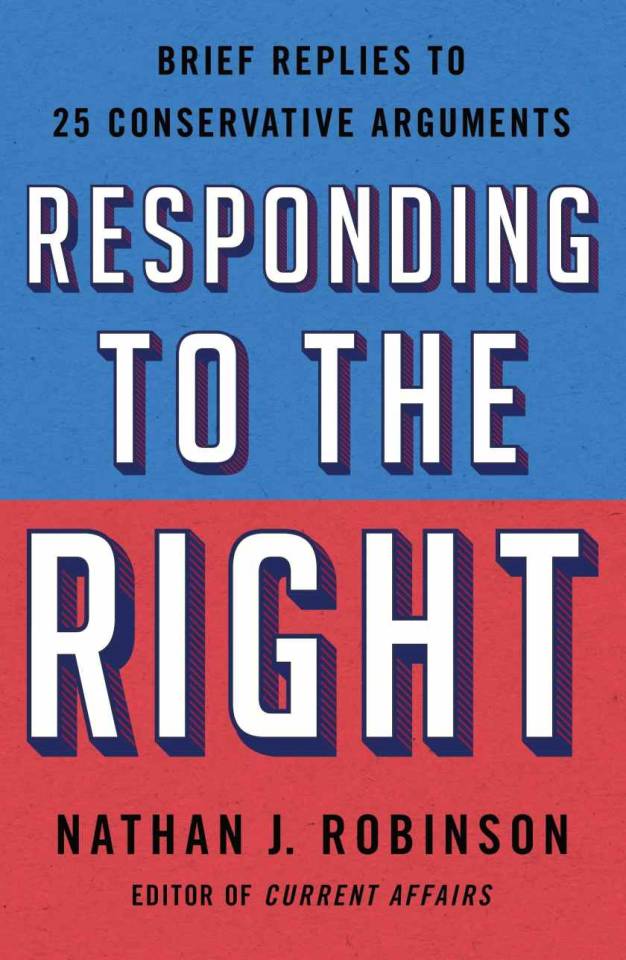
Robinson describes conservativism as a comforting, fixed ideology that allows its adherents to move through the world without having to question themselves: you broke the law, so you're guilty. No need to ask if the law was just or unjust. This sidelines sticky moral dilemmas: no need for judges to ask if something is good or fair – merely whether it is "original" to the Constitution. No need for a CEO to ask whether a business plan is moral – only whether it is "maximizing shareholder benefit." Robinson anatomizes the most effective parts of conservative rhetoric and exhorts his leftist comrades to learn from it, and put it to better use.
https://pluralistic.net/2023/02/14/nathan-robinson/#arguendo
V. A Collective Bargain by Jane McAlevey
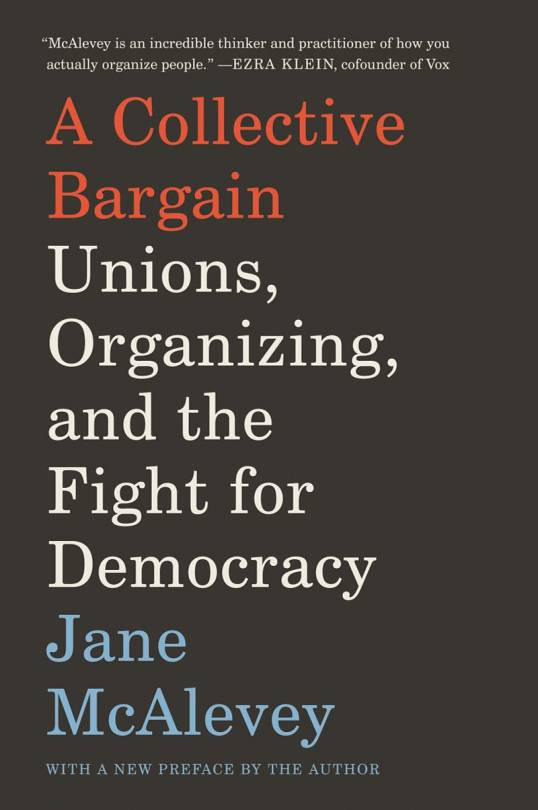
An extraordinary book that is one part history lesson, one part case-study, two parts how-to manual, one part memoir, and one million parts call to action. McAlevey devotes the early chapters to the rise and fall of labor protections in America, explaining how the wealthy mounted a sustained, expensive, obsessive fight to smash union power. She moves into a series of case-studies of workers who tried to organize unions under these increasingly inhospitable rules and conditions. The second half of the book is two case studies of mass strikes that succeeded in spite of even stiffer opposition. For McAlevey, saving America is just a scaled up version of the union organizer’s day-job.
https://pluralistic.net/2023/04/23/a-collective-bargain/
VI. Open Circuits by Windell Oskay and Eric Schlaepfer

A drop-dead gorgeous collection of photos of electronic components, painstakingly cross-sectioned and polished. The photos illustrate layperson-friendly explanations of what each component does, how it is constructed, and why. Perhaps you've pondered a circuit board and wondered about the colorful, candy-shaped components soldered to it. It's natural to assume that these are indivisible, abstract functional units, a thing that is best understood as a reliable and deterministic brick that can be used to construct a specific kind of wall. Peering inside these sealed packages reveals another world, a miniature land where things get simpler – and more complex.
https://pluralistic.net/2023/08/14/hidden-worlds/#making-the-invisible-visible-and-beautiful
VII. Doppelganger by Naomi Klein
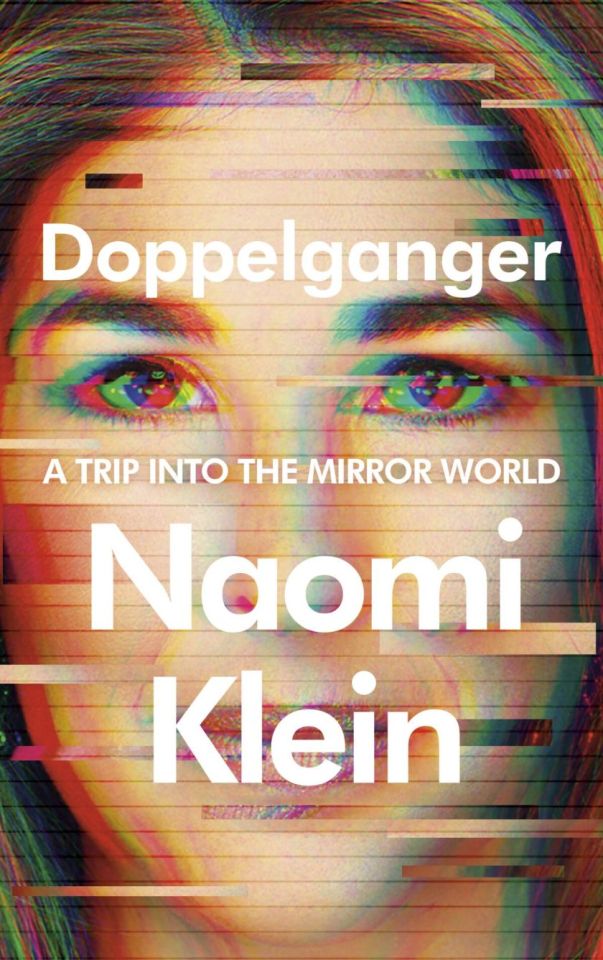
This is a very odd book. It is also a very, very good book. The premise – exploring the divergence between Naomi Klein and Naomi Wolf, with whom she is often confused – is a surprisingly sturdy scaffold for an ambitious, wide-ranging exploration of this very frightening moment of polycrisis and systemic failure. For Klein, the transformation of Wolf from liberal icon – Democratic Party consultant and Lean-In-type feminist icon – to rifle-toting Trumpling with a regular spot on the Steve Bannon Power Hour is an entrypoint to understanding the mirror world. How did so many hippie-granola yoga types turn into vicious eugenicists whose answer to "wear a mask to protect the immunocompromised" is "they should die"?
https://pluralistic.net/2023/09/05/not-that-naomi/#if-the-naomi-be-klein-youre-doing-just-fine
VIII. Your Face Belongs to Us by Kashmir Hill
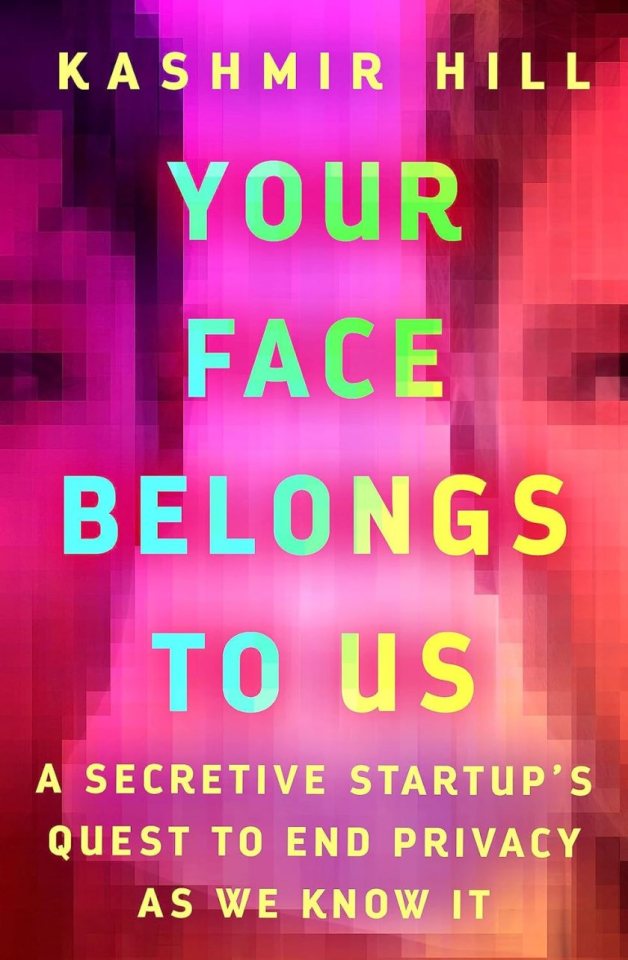
A tell-all history of Clearview AI, the creepy facial recognition company whose origins are mired in far-right politics, off-the-books police misconduct, sales to authoritarian states and sleazy one-percenter one-upmanship. Facial recognition is now so easy to build that – Hill says – we're unlikely to abolish it, despite all the many horrifying ways that FR could fuck up our societies.
https://pluralistic.net/2023/09/20/steal-your-face/#hoan-ton-that
IX. Blood In the Machine by Brian Merchant
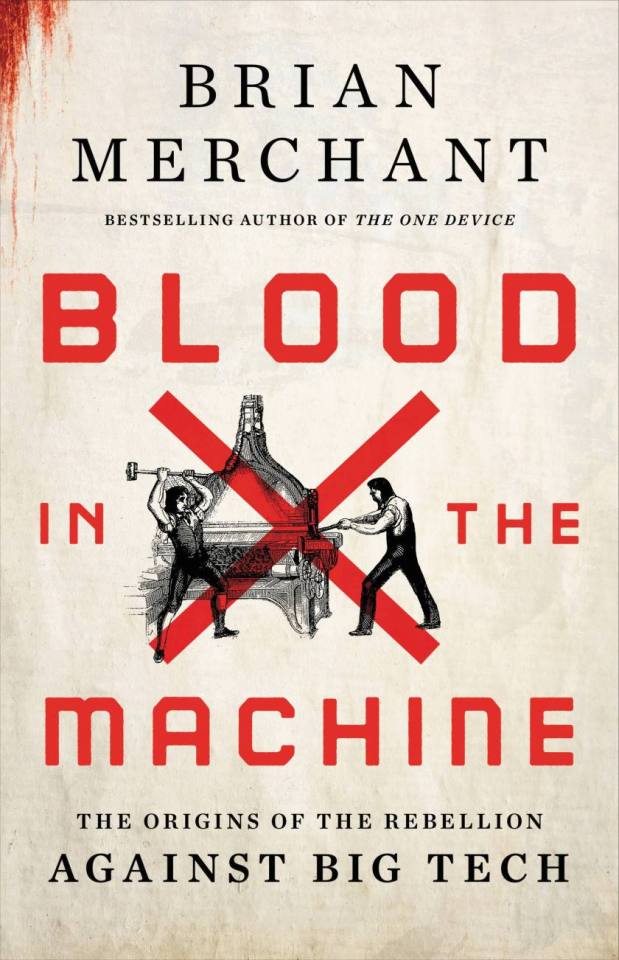
The definitive history of the Luddites, and the clearest analysis of the automator's playbook, where "entrepreneurs'" lawless extraction from workers is called "innovation" and "inevitable." Luddism has been steadily creeping into pro-labor technological criticism, as workers and technology critics reclaim the term and its history, which is a rich and powerful tale of greed versus solidarity, slavery versus freedom. Luddites are not – and have never been – anti-technology. Rather, they are pro-human, and see production as a means to an end: broadly shared prosperity. The automation project says it's about replacing humans with machines, but over and over again – in machine learning, in "contactless" delivery, in on-demand workforces – the goal is to turn humans into machines.
https://pluralistic.net/2023/09/26/enochs-hammer/#thats-fronkonsteen
X. Technofeudalism by Yanis Varoufakis
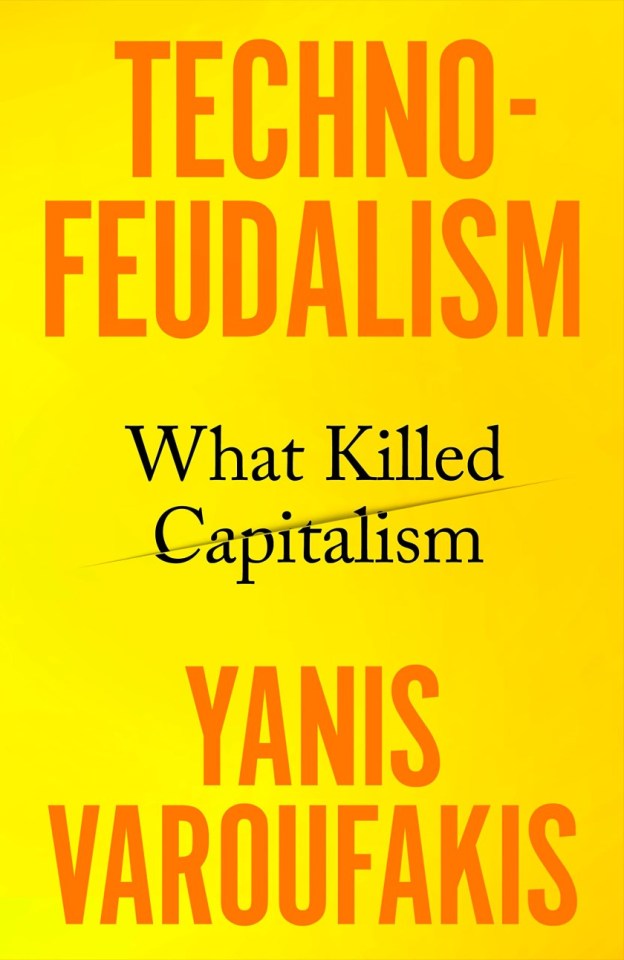
Varoufakis makes an excellent case that capitalism died a decade ago, turning into a new form of feudalism: technofeudalism. A feudal society is one organized around people who own things, charging others to use them to produce goods and services. In a feudal society, the most important form of income isn't profit, it's rent. Varoufakis likens shopping on Amazon to visiting a bustling city center filled with shops run by independent capitalists. However, all of those capitalists are subservient to a feudal lord: Jeff Bezos, who takes 51 cents out of every dollar they bring in, and furthermore gets to decide which products they can sell and how those products must be displayed. The postcapitalist, technofeudal world isn't a world without capitalism, then. It's a world where capitalists are subservient to feudalists ("cloudalists" in Varoufakis's thesis), as are the rest of us the cloud peons
https://pluralistic.net/2023/09/28/cloudalists/#cloud-capital
XI. Underground Empire by Henry Farrell and Abraham Newman
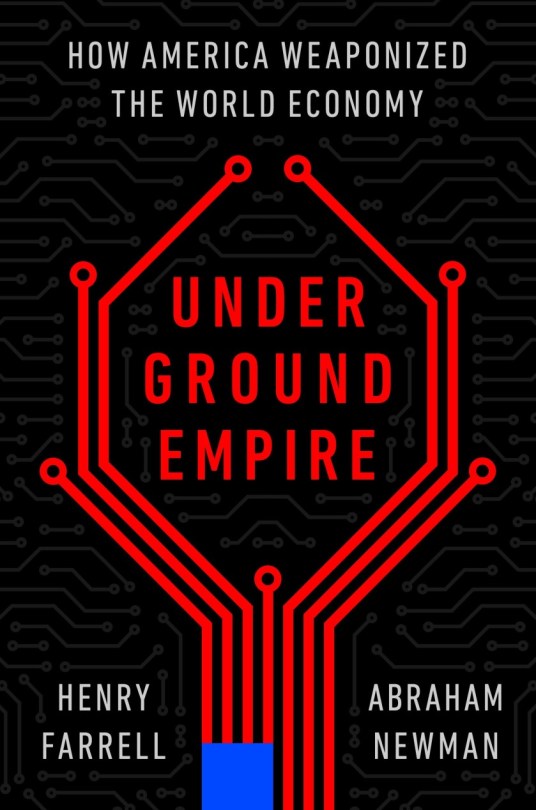
Two political scientists tell the story of how global networks were built through accidents of history, mostly by American corporations and/or the American state. The web was built by accident, but the spider at its center was always the USA. At various junctures since the Cold War, American presidents, spies and military leaders have noticed this web and tugged at it. A tariff here, a sanction there, then an embargo. The NSA turns the internet into a surveillance grid and a weapon of war. The SWIFT system is turned into a way to project American political goals around the world – first by blocking transactions for things the US government disfavors, then to cut off access for people who do business with people who do things that the US wants stopped. Political science, done right, has the power to reframe your whole understanding of events around you. Farrell and Newman set out a compelling thesis, defend it well, and tell a fascinating tale.
https://pluralistic.net/2023/10/10/weaponized-interdependence/#the-other-swifties
XII. How Infrastructure Works by Deb Chachra

A hopeful, lyrical – even beautiful – hymn to the systems of mutual aid we embed in our material world, from sewers to roads to the power grid. It's a book that will make you see the world in a different way – forever. It's a bold engineering vision, one that fuses Chachra's material science background, her work as an engineering educator, her activism as an anti-colonialist and feminist. The way she lays it out is just…breathtaking.
https://pluralistic.net/2023/10/17/care-work/#charismatic-megaprojects

Like I said, this has been a good year in books for me, and it included three books of my own:
I. Red Team Blues (novel, Tor Books US, Head of Zeus UK)
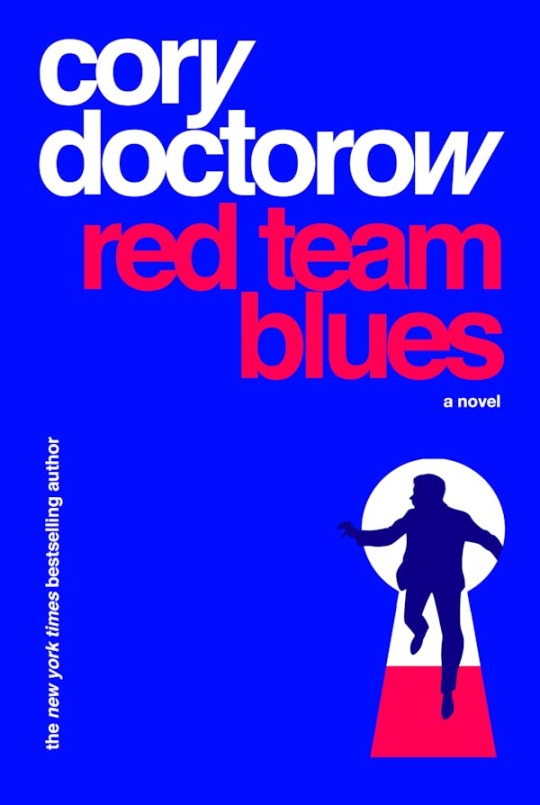
Martin Hench is 67 years old, single, and successful in a career stretching back to the beginnings of Silicon Valley. He lives and roams California in a very comfortable fully-furnished touring bus, The Unsalted Hash, that he bought years ago from a fading rock star. He knows his way around good food and fine drink. He likes intelligent women, and they like him back often enough. Martin is a—contain your excitement—self-employed forensic accountant, a veteran of the long guerilla war between people who want to hide money, and people who want to find it. He knows computer hardware and software alike, including the ins and outs of high-end databases and the kinds of spreadsheets that are designed to conceal rather than reveal. He’s as comfortable with social media as people a quarter his age, and he’s a world-level expert on the kind of international money-laundering and shell-company chicanery used by Fortune 500 companies, mid-divorce billionaires, and international drug gangs alike. He also knows the Valley like the back of his hand, all the secret histories of charismatic company founders and Sand Hill Road VCs. Because he was there at all the beginnings. Now he’s been roped into a job that’s more dangerous than anything he’s ever agreed to before—and it will take every ounce of his skill to get out alive.
https://us.macmillan.com/books/9781250865847/red-team-blues
II. The Internet Con: How to Seize the Means of Computation (nonfiction, Verso)
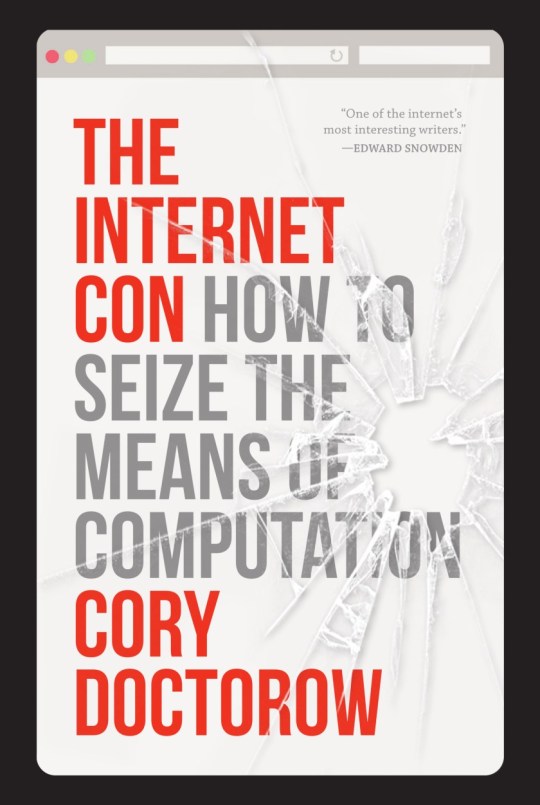
We can – we must – dismantle the tech platforms. We must to seize the means of computation by forcing Silicon Valley to do the thing it fears most: interoperate. Interoperability will tear down the walls between technologies, allowing users to leave platforms, remix their media, and reconfigure their devices without corporate permission. Interoperability is the only route to the rapid and enduring annihilation of the platforms. The Internet Con is the disassembly manual we need to take back our internet.
https://www.versobooks.com/products/3035-the-internet-con
III. The Lost Cause (novel, Tor Books US, Head of Zeus UK)

For young Americans a generation from now, climate change isn't controversial. It's just an overwhelming fact of life. And so are the great efforts to contain and mitigate it. Entire cities are being moved inland from the rising seas. Vast clean-energy projects are springing up everywhere. Disaster relief, the mitigation of floods and superstorms, has become a skill for which tens of millions of people are trained every year. The effort is global. It employs everyone who wants to work. Even when national politics oscillates back to right-wing leaders, the momentum is too great; these vast programs cannot be stopped in their tracks.
But there are still those Americans, mostly elderly, who cling to their red baseball caps, their grievances, their huge vehicles, their anger. To their "alternative" news sources that reassure them that their resentment is right and pure and that "climate change" is just a giant scam. And they're your grandfather, your uncle, your great-aunt. And they're not going anywhere. And they’re armed to the teeth. The Lost Cause asks: What do we do about people who cling to the belief that their own children are the enemy? When, in fact, they're often the elders that we love?
https://us.macmillan.com/books/9781250865939/the-lost-cause

I wrote nine books during lockdown, and there's plenty more to come. The next one is The Bezzle, a followup to Red Team Blues, which comes out in February:
https://us.macmillan.com/books/9781250865878/thebezzle
While you're waiting for that one, I hope the reviews above will help you connect with some excellent books. If you want more of my reviews, here's my annual roundup from 2022:
https://pluralistic.net/2022/12/01/bookishness/#2022-in-review
Here's my book reviews from 2021:
https://pluralistic.net/2021/12/08/required-ish-reading/#bibliography
And here's my book reviews from 2020:
https://pluralistic.net/2020/12/08/required-reading/#recommended-reading


It's EFF's Power Up Your Donation Week: this week, donations to the Electronic Frontier Foundation are matched 1:1, meaning your money goes twice as far. I've worked with EFF for 22 years now and I have always been - and remain - a major donor, because I've seen firsthand how effective, responsible and brilliant this organization is. Please join me in helping EFF continue its work!

If you'd like an essay-formatted version of this post to read or share, here's a link to it on pluralistic.net, my surveillance-free, ad-free, tracker-free blog:
https://pluralistic.net/2023/12/01/bookmaker/#2023-in-review
54 notes
·
View notes
Text
thinking about how they could have done their "soft reboot" if they just like. skipped ahead 50-100 years. solas could have gone into hiding so as to avoid the inquisitor meddling because he PERSONALLY KNOWS the inquisitor is a meddler. rook could have one of the faction backgrounds but also have been conscripted into this group that varric formed decades ago, and each companion could be some kind of liaison between their faction and said group. this could help explain why the antivan crows and tevinter are so wildly different from past canon, and why the lords of fortune are a super ethical artifact retrieval service even with their motto - if isabela formed them as treasure hunters and the org changed over time, they could have kept the motto while making themselves less thieves and more like adventurous archivists. ALSO how the veil jumpers even exist when we've never heard of them before yet they can fix eluvians with ease (merrill could have been the founder of that!) and why necromancers are a normalized thing bc while i'm not the best at dragon age lore that was kind of wild to me lol. AND why the antaam/venatori could have changed so much that they'd push aside old prejudices and work together with elven gods.
and you could still do the grey warden griffon thing. another hundred years would not matter.
so everything in this specific plot could actually make sense if you pushed it ahead another century ish. and that way you wouldn't have to base the entire thing on what people did in inquisition but still be able to reference it. like it could have been done but instead we get. this
8 notes
·
View notes
Text
🎀 SBG / CITY OF MIST: ereighkauh torres-santiago 𐙚 ‧₊˚ ⋅



behold, my newest City of Mist character-- except there's a twist: she's from a School Bus Graveyard Campaign (˶˃ ᵕ ˂˶) .ᐟ.ᐟ




HEYAAAA !! my friends and i, having read SBG together, is particularly fond of that special webtoon. since we're a dungeons & dragons friend group (i KEEP on mentioning this i'm SORRY i just love them and theyre essentially the catalyst for my creative strike this year but uhm, i'm on another tangent again xD) my wonderful DM friend, mel, said: "hey, what if we did an SBG oneshot?"
buuuut, there was another problem: if we we're gonna do an SBG oneshot, what TTRPG system would we use ?? obviously we can't use the D&D systems .... but there was another ttrpg system we were familiar with that mel introduced us to a few months ago !! CITY OF MIST !
we just got rid of the mythos theme card and replaced the 4 theme cards with logos, which you could see from above :]
the session is still yet to be held ... but i can't wait to update once we finish it !! if the oneshot goes well, there's a chance it might turn into a mini campaign (˶ᵔ ᵕ ᵔ˶)
ON ANOTHER NOTE...
you might be wondering: "why is her name ereighkauh? don't you already have another character named ereighkauh?"
WELL HAUHAUHAUHAHU i actually have 2 more characters named ereighkauh !! my minecraft SMP, my water genasi from tht one oneshot, and this.
it's basically an EREIGHKAUH: THE MULTIVERSE kind of character collection, where projections of me, erika, are transported into that universe <33 that's why you could see that torres-santiago looks a little like me ... BECAUSE SHE'S BASED OFF OF ME !!
and trust, there are more ereighkauhs to come :)
ON ANOTHER ANOTHER NOTE... (oh god when will she stop yapping)
i just want to put up a bit of ET-S's lore out here:
ets family are filipino immigrants (we assume that SBG is in a western modern setting) > dad got framed for a crime > BOOM SHOT > ets mad > forms a rebellious activist organization seeking to reform system and inform mainly through graffiti and art > called brushfire syndicate > has gathered 15-20 members > its a tightknit community and they are all close > ofc ets has a different persona in BS > her jacket is INVERTIBLE, that pink one u see her wearing is her daily wear > the reverse side is a colorful neon graffiti glow in the dark jacket and every other synonymous adjective for CHAOTICALLY FUN jacket > but anyways she goes to art school
tbh her being a leader of a small org was on purpose so that when the team gets sent into the shadow realm they'd have easy access to supplies and safehouses XD + urban terrain mastery so she parkours the hell outta there WHAUJSDAKSD
AND ALSO !! she has a black cat and a golden retriever :) very important detail yesyes <3333

#𓏲 ๋࣭ ࣪ ˖🎐 artdiaeries#school bus graveyard#sbg#schoolbusgraveyard#i didnt expect her to be so pink#but here we are#sbg (webtoon)#if i turn her into a proper CoM character#ill be thinking of her mythos#ereighkauh: the multiverse#art#digital drawing#digital art#illustration
4 notes
·
View notes
Note
You are probably aware of this given your interest in the topic, but some other interesting things to look at for the fucked up fertility industry (and how they absolutely don't give a fuck about their patients/clients or the children they produce):
This piece from reveal specifically talks about how fertility clinics downplay something as basic and fundamental as the health risks of twins and triplets.
https://revealnews.org/podcast/misconceptions/
Sarah Zhang (excellent science writer) has written a lot (mostly for The Atlantic) about fertility ethics and legal issues. In this piece, she talks about a case where a clinic mix up led to a couple using the wrong samples to conceive, and that only coming to light years later, and the ensuing legal case
https://www.theatlantic.com/science/archive/2019/07/ivf-embryo-mix-up-parenthood/593725/
I think I've already seen you talk about The Retrievals, but good lord that's fucked up.
Yes I did listen to the The Retrievals!! I think last month or the month before. Really lays bare how medicine is not exempt from cultural beliefs, with the juxtaposition of real medical issues (pain from lack of anesthesia) and the constructed medical issue (you want to conceive a baby) - the patriarchal constructed idea taking precedence over real women's pain. Highly recommend any feminist listen to it.
It definitely should come to no surprise to any feminist that the for-profit fertility and adoption industries looooove to lie, much like any industry! It comes in the form of lobbying, creative marketing, and of course just straight up lying to your customers. The fertility industry and the plastic surgery industry in my mind are holding hands in this way, that recovery from any of these procedures is easy, no worries, like magic. And of course, the over reliance on detached clinical language when it suits them (like in ads to egg donors...a sort of "you aren't using them, who cares!") just to flip to over reliance on pathos when it suits them ("we understand your internal need to hold a baby in your arms, it's more powerful than science" sort of talk), when really neither the emotional nor physical repercussions should be taken lightly. It's easy to persuade a young 20 something who needs money that her genetic material totally has no emotional weight, dude. just like it's easy to rely on the magical thinking that already exists in the cultural conscience to persuade women that pregnancy is sort of a nebulous, a baby is just small and then it just gets big, who knows what goes on in there process, instead of a long set of very specific biological processes that require many of your resources. Like, it really is your blood and energy and hormones making this baby, not just your "womb" doing "magic".
One of the things I find alarming is if you search "risks of egg donation" is how the results from all sorts of different .coms and .orgs are all over the place, with few linked sources, and a general blase attitude of how there are few proven risks to date...but also the process requires you to give yourself hormonal injections every single day for minimum two weeks. I'm not saying you should start believing conspiracies and think "well definitely there are risks being ignored and hidden on purpose", I'm just saying it follows a pattern in women's health, where things are understudied and the more convenient narrative is believed over trying to get data. What do we actual know about injecting hormones every day for two weeks (at least) for the long term? I don't know!!! There doesn't seem to be any serious data anywhere. Could be low risk, could be high risk, who cares!!! Do it three or four or five times for $$$ and you can find out in 5 or 40 years, if you're even believed.
25 notes
·
View notes
Text
Characters for Veins of Twilight
The Twins (Ceil and Cyris):
Opposites in every way, one is shy and kind(Ceil), the other loud and arrogant(Cyris). They share an uncanny bond that seems almost telepathic.
You only catch fleeting glimpses of them—a shadow slipping around a corner, the faint outline of two figures standing in a window high above the street. There’s something ethereal about them, something that makes them feel both otherworldly and uncomfortably real.
Curiosity gnaws at you, and you can’t resist asking around. But the townsfolk grow tight-lipped the moment the twins are mentioned. Their worried glances and hurried whispers make it clear: You’re better off not knowing. Yet, amid the half-answers and evasions, you manage to glean a few scraps of information.
The twins live in the grand mansion perched on the hill overlooking the town, a crumbling but imposing estate surrounded by iron gates and overgrown gardens. It’s a place the townspeople avoid, murmuring warnings about strange noises and unnatural lights that flicker in the windows late at night.
You’ve also heard they’re as different as night and day. One of the twins is painfully shy, a soft-spoken soul with a gentle kindness that almost makes you forget the unease surrounding their name. The other? Brazen and arrogant, with a voice that can silence a room and eyes that seem to see straight through you.
But there’s one thing they share in common, and that’s you.
At first, it’s subtle—an odd coincidence. You find yourself walking the same streets as the twins, their elusive presence never far from your periphery. You feel the weight of their gazes when you pass the mansion gates, though you never see them watching. Letters, unsigned and written in elegant but unsettling handwriting, begin appearing at your door. Each one tells you something new about yourself—things no one else could possibly know.
Soon, the town starts to feel smaller, the walls closing in around you as the twins’ influence grows more pronounced. People you once trusted now treat you differently, as if you’ve been marked. Whispers follow you wherever you go, and you begin to wonder if this connection to the twins is fate—or a curse.
The mansion on the hill beckons, and the twins await. Whatever they want from you, it’s clear they won’t stop until you find out.
The Librarian (Silas):
The librarian is an enigma wrapped in quiet authority. He always sits at the massive wooden desk in the center of the library, surrounded by an endless sea of books that seem to stretch into the shadows. Despite your frequent visits, you’ve never seen his eyes open. They remain shut, as though he doesn’t need them to see. Instead, there’s always that mischievous smile curling at the corners of his lips—a smile that makes you feel like he knows more about you than you do yourself.
The library is a haven of sorts, the only place in town where you feel you might find answers about the strange happenings you’ve encountered. But it’s also a trap, one you walk into willingly despite the librarian’s constant warnings.
“You’re digging too deep,” he tells you each time, his voice a melodic lilt that’s equal parts teasing and foreboding. “There are things better left buried, my dear.”
But he never stops you. If anything, he seems amused by your persistence. When you ask for specific books, he retrieves them with unnerving precision, always producing exactly what you need—or what he wants you to find.
You’ve tried asking him outright about the town’s secrets, but his answers are always cryptic, wrapped in riddles that leave you more frustrated than enlightened.
“What’s the point of a mystery if you’re given the solution?” he says with a chuckle, turning a page in a book he seems to read without looking at.
Yet, there’s a flicker of something beneath his playful demeanor—something calculating. You’ve come to realize that the librarian doesn’t share knowledge without a price. Sometimes, it’s a trivial request—a promise to organize a row of books or recite an old poem from memory. Other times, the cost feels far more personal.
“Tell me about the dreams you’ve been having lately,” he asked once, unprompted, his smile widening as though he already knew the answer.
When you hesitated, he simply shook his head and withdrew the book you needed, sliding it just out of reach.
“Knowledge is a trade, not a gift,” he reminded you, his tone lilting with mock disappointment.
Still, you can’t stay away. The library holds too many clues, too many pieces of the puzzle you’re trying to assemble. And the librarian? He’s the gatekeeper to it all, a shadowy figure whose true intentions remain as much a mystery as the town itself.
One thing is clear: he knows more than he lets on, and you can’t help but wonder what it would take to uncover the truth hidden behind that perpetual, knowing smile.
The Breakfast shop boy (Espen):
The breakfast shop boy is a beacon of normalcy in a town that seems anything but. He’s the kind of person whose cheerful demeanor instantly makes you feel like everything might actually be okay. With his ever-present smile and warm, easy-going attitude, he manages to turn even the most mundane interactions into moments of genuine comfort.
The small breakfast shop where he works is a cozy haven, filled with the smell of freshly baked pastries and brewing coffee. It’s one of the few places in town that feels untouched by the strange, oppressive air lingering elsewhere. The boy greets you by name every time you walk in, his voice bright and familiar, as if he’s known you forever.
You quickly grow fond of him, drawn to the way he listens so attentively, asking questions that make you feel seen and understood. But as the days go by, you begin to notice something strange. Every conversation you have with him somehow shifts the focus onto you. You find yourself sharing your thoughts, your past, your fears, and your hopes, all while realizing you know almost nothing about him.
When you try to ask about his life—where he’s from, why he’s in this odd town—he always deflects with a laugh or a vague comment. “Oh, my story’s not all that interesting,” he’ll say, brushing it off as if it doesn’t matter. And maybe it doesn’t. After all, his presence alone is enough to make you feel safe, like someone in this unsettling place has your back.
But sometimes, in the quiet moments, you can’t shake the feeling that his constant smile is just a little too perfect, that the way he steers conversations isn’t as innocent as it seems. After every encounter, you’re left with the uneasy realization that, for all the warmth he exudes, you still don’t know who he really is.
Still, he’s the one person in town you feel like you can trust—or, at least, you want to. Because in a place where everyone seems to have secrets, a kind smile might be the only thing keeping you from succumbing to the darkness.
The Clockmaker (Tiago):
They are always found in their dimly lit shop, surrounded by ticking clocks of every size and design. Their voice is soft, barely more than a whisper, and when they speak, it often seems as though their mind is somewhere far away, lost in a labyrinth of thoughts only they can navigate. Their words are poetic yet disjointed, as if they’re recounting fragments of dreams rather than engaging in conversation.
Their hands move with eerie precision as they work, adjusting delicate gears and winding springs. Despite their reserved demeanor, you can’t help but feel that the clockmaker knows more about you than they let on. Occasionally, they’ll murmur something cryptic—an odd comment about time running out, or the past being closer than it seems—that leaves you unsettled long after you leave the shop.
The clocks themselves are mesmerizing, each one seemingly unique, ticking in rhythms that sometimes align with your own heartbeat. There’s an uncanny sense that they aren’t just measuring time but manipulating it, bending it to the clockmaker’s will.
When you ask questions about the town or the strange occurrences you’ve experienced, the clockmaker rarely answers directly. Instead, they’ll say something vague, like, “Time has its way of revealing all truths,” or, “Some moments aren’t meant to be revisited, no matter how much they call to you.”
Despite their distant nature, there’s a profound sadness that lingers in their eyes—when they bother to look at you. It makes you wonder what moments in time they’re trying to hold on to, or what they’re desperately trying to forget.
You can’t help but feel that stepping into their shop is like entering a liminal space, caught somewhere between past, present, and future. And the longer you stay, the harder it is to tell if time is moving forward—or standing still.
The Alchemist (Koa):
The alchemist is by far one of your favorite people to talk to, though “talk” might be too generous a word for the games of wit and manipulation he prefers. His workshop, tucked away in a shadowy corner of the town, exudes an aura of mystery and chaos. Bottles of glowing liquids bubble on shelves, peculiar herbs dangle from the ceiling, and the faint smell of something metallic always lingers in the air.
With sharp, calculating eyes and a smirk that seems permanently etched on his face, the alchemist never answers your questions outright. Instead, he dangles answers like bait, always just out of reach. “I could tell you,” he says, leaning over a table strewn with bizarre instruments, “but what would be the fun in that?”
If you want his help, you’ll have to pay the price—and it’s rarely money he wants. Perhaps he’ll demand you drink one of his experimental potions, promising it will “only slightly” alter your perception of reality. Other times, he’ll turn the tables, treating you like one of his experiments, asking pointed, invasive questions that feel like he’s peeling back the layers of your mind. He pokes and prods at your fears, your motives, and your secrets, dissecting you with unnerving precision.
Yet, despite his games and the thinly veiled danger he carries, you find yourself drawn to him. There’s an air of confidence about the alchemist, a sense that he’s untouchable. He moves through the town with an almost arrogant ease, unbothered by its dangers. While others whisper warnings or flinch at the town’s shadows, he seems to revel in them, as if he’s stronger than the forces at play—or perhaps part of them.
Every so often, he drops cryptic hints about the town’s mysteries, as if he knows far more than he’s letting on. “The truth isn’t what you think,” he might say, swirling a glowing flask in his hand. “But then, it rarely is.”
And while his intentions remain unclear, one thing is certain: the alchemist is far more than he seems, and his help, while tantalizing, always comes with strings attached. The question is, how far are you willing to go to unravel the town’s secrets—and how much of yourself are you willing to let him see?
#yandere#yandere ocs#Koa#Silas#Tiago#Espen#Ceil#Cyris#veins of twilight#veinsoftwilight#writers on tumblr#writing#dark romance#dark fantasy#toxic love#love#yande.re
6 notes
·
View notes
Text
for people who dont know.
im getting a puppy to train as a prospective assistance dog. it'll be owner-trained, but with input from professional trainers / orgs that work to help owner-trainers. the dog will primarily be trained to help me with mobility related tasks (fetching things, helping with doors, picking up dropped items) but some tasks to help me with autism + mental health as well.
realistically, the dog may not succeed as an assistance dog, but i will keep it as a pet dog even if it can't manage public access. but i will be doing my absolute best to do everything as well as i can for it!
the dog is going to be a golden retriever. i looked into both goldens and labs but i found a good golden breeder first so i went with that. they've had dogs in their line successfully graduate from assistance dog charities, and the mother + grandmother are both therapy dogs, so i'm pretty optimistic at least about the dogs base potential.
i'll probably want to look into some obedience work and maybe some dog sports to do as a hobby too, but i need to work out what would be accessible to me with my disabilities.
i'm really excited though. i hope to reach a point where i can be independent, relying just on my personal assistant, dog and physical aids. that would be my ideal! i think i'm doing all of the right things to get there.
4 notes
·
View notes
Text

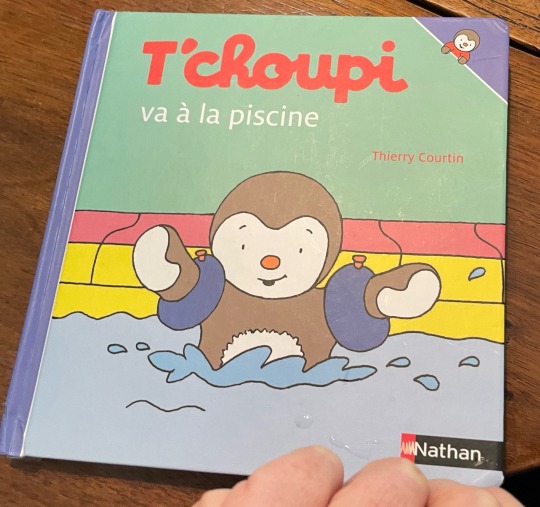


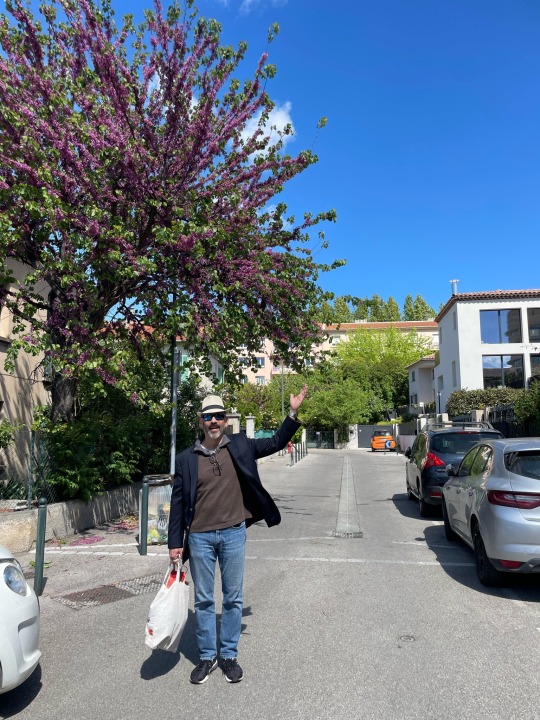
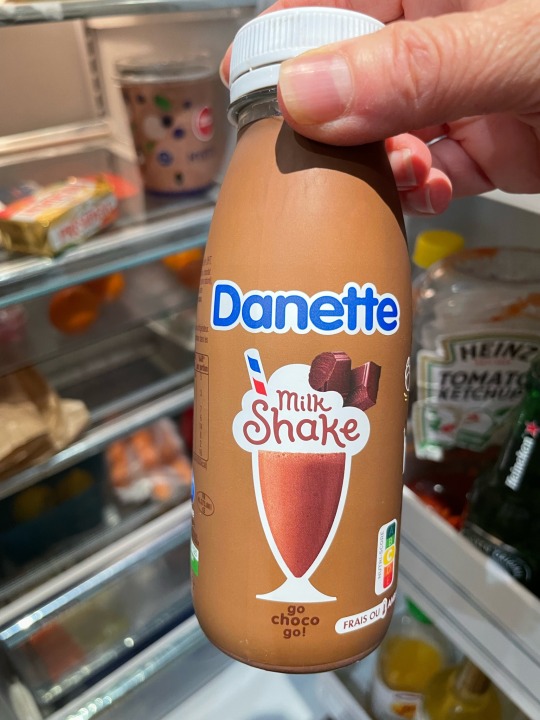

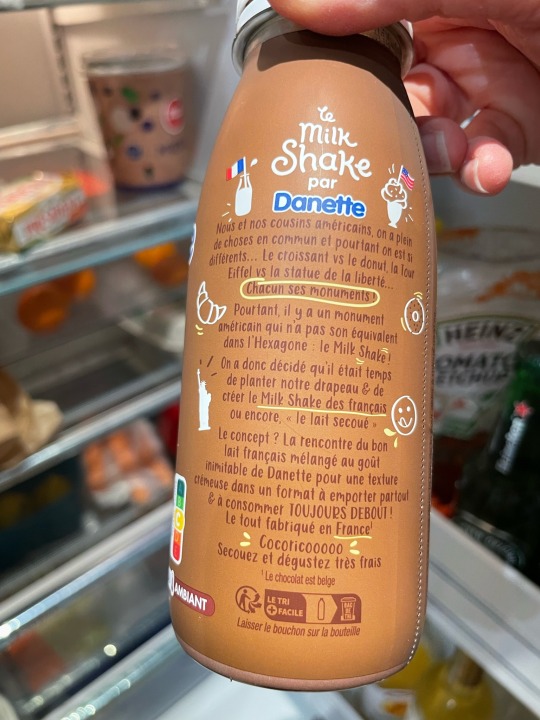
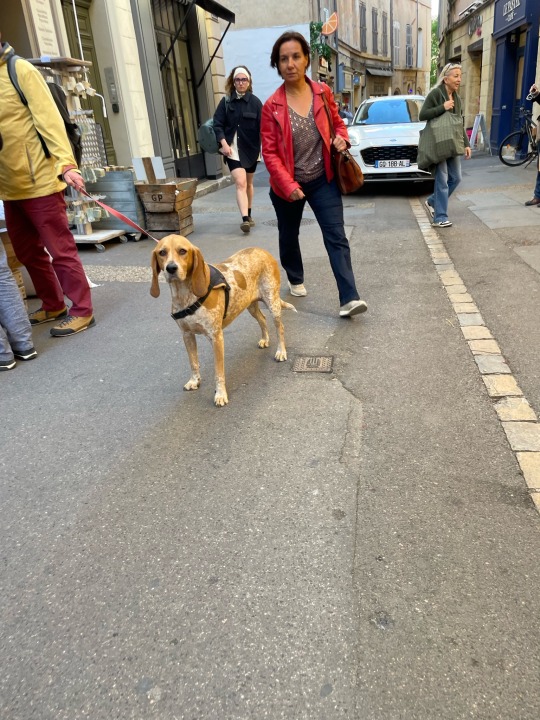

4/17/24: I am really loving my new French tutor, T'Choupi! I meant to post his(?) pic yesterday, but instead chose to post a mistakenly taken selfie, which was dumb. Anyway, we are still quite jet lagged but my travel partner is awesome at handling this stuff. He suggested we don't go to ANY museums today and instead we ambled around Aix and ate pastry and napped...SO fun!!! We walked around the corner from our place and checked out the "Casino," a local supermarchè and despite its name, there were no slot machines there. We bought 17 different kinds of cheese to sample, French deodorant for each of our kids (long story don't ask), some fresh fruits, and snacky items. Those who know me (and why would you feel obligated to be reading this if you didn't), know that one of my top travel activities is visiting the local grocery. Best way to sample the local fare, or at least the most popular junk food and candy, like the Danette milkshake. On the back of the bottle is their commentary on American “monuments” (icons?) versus those of “l’Hexagone,” which I guess refers to France and the hexagonal shape of this country…has anyone heard that reference before? I had not. In any event, Danette believes that l’Hexagone lacked anything like the “monument Americain Milkshake!” And now they have created it: << le lait secouè >> !! I liked it, but it ain’t no Village Ice Cream’s MCR!!!* (*Midnight Caramel River, Claude’s fave back in Maplewood).
We tried to walk back to the Nespresso store, but wound up going in circles and never found it, even with the google map. Claude began questioning his bat echolocation skills, but I knew it was just around a corner that we were not noticing. I was actually right, and we got back to it later, when we would sip our 4th cup of coffee with a petit square au chocolat mixed in. Buzzzzzzzzzz!
We grabbed a little late brekky from a recommended patisserie—a jambon n mushroom toasty thing, mini quiche, and 2 pain au chocolats. We ate on our back terrace in the shade, and napped on a chaise with our feet sticking out in the sun…☀️ (those minstrel--I mean Mistral--breezes can be chilly!!)
After our rest by our sweet little piscine (thanks T’Choupi!) we got up and out again to forage for more tasty stuff for dinner at home. We had to be back at our pad in the evening for my ONE and only zoom meeting I agreed to attend during our time away. Claude also agreed to attend one meeting—no big deal.
In any event, our second foraging trip led us down the street to a random boulangerie, just to check out the bread situation for tomorrow morning (when Claude will wake up early and prance down the street to retrieve our croissants and sweet treats before I awaken). But why not sample the pastry now as well, and what a delicious whaddyacallit it was. Elephant ear? Starts with a 'P'? Anyone? I can't stop now to figure it out, or I'll never get to bed.* But we shared it as we wandered around some more, and shortly thereafter, we bumped into a charcuterie (which is not hard to do around here). We grabbed some jambon and saussison sec, and across the street, we bought a baguette and a unique looking olive bread that was sort of trying to shape itself like a soft pretzel. All of it was just great, and wonderful to sit and munch at the kitchen counter, drinking rosè while listening to a webinar about the future plans of the NCJW/Essex, the org I have been volunteering with for (has it really been?) 7+ years. Good night!!
*Palmier!!
3 notes
·
View notes
Text
Okay, so Day 9 with Marluxia is where significant lore inaccuracies start.
First of all, we start with Purebloods not releasing Hearts, and Emblem Heartless releasing Hearts, which in DDD becomes the inaccurate retcon of Purebloods not having Hearts, when in fact, they are literally Hearts. Just like how Nobodies are actually Bodies, Dream Eaters are actually Dream Constructs, Unversed are actually aware of their existences, and are based on emotions that are expressed, or "versed".
In the original canon, the reason Purebloods did not release hearts was because they were too corrupted by darkness, as they were fully submerged into the Darkness hivemind, whereas Emblem Heartless, being artificial creations, retained some sense of individuality. Once a Pureblood was defeated, it was assumed given their darkness level they would re-manifest until purification, or purify over a longer time, that we as the player character do not see.
Second is the idea they actually need a Keyblade to collect hearts to create Hearts of All Men, when in actuality, they have been collecting Hearts artificially, as we see in the Heartless Generator, and KH2's script implies Altar of Naught was designed specifically to retrieve purified Hearts away from the real Kingdom Hearts. It is possible that Vexen studied Kingdom Key to achieve this, as he talks before the mission (implying the Keyblades/Keychains obtained in this game are mostly his creations), but even then they were still indeed collecting Hearts, so the statement is just incorrect.
Unfortunately, the plot of the game is built on this incorrect idea.
Third issue is not that big of a deal. Since Marluxia gives you the tutorial of defeating Heartless, this becomes in Union X the idea Lauriam was somehow better than other Dandelions at defeating Heartless, and his quick bond with Roxas was actually a continuation of his bond with Ventus (who is still inside Roxas, not Sora).
This is a weird, though not necessarily bad case of Flanderization (again, tropes are not inherently bad), since the actual reason Marluxia does this is because as the second strongest member of the Org. 13 at the time, and one that desires to have a tool with a Keyblade, he would be most efficient in dealing with Heartless, and would seek Sora's Nobody as he will seek Sora himself in CoM.
(Of course, this event in Days will also be somewhat unimportant, as Union X will imply the main reason he sought after Sora was because he was carrying his original Keyblade, Divine Rose, which like most of the KH1 Keyblades was originally meant to be manifestation of the heart of Beast's Castle's world before the retcon.)
This additional context does not ruin the progression of the story, but weakens characters' actions, which in Marluxia's case is kinda bad, considering he is the brother of our "new" main character Strelitzia, and will almost certainly become a major recurring character both because of this, and his sheer power level.
****
I suppose we should also talk about Marluxia's element, flowers.
While there are many powerful plant monsters in FF, there is no plant-based elemental affinity in any of the FF games, except ironically in Kingdom Hearts. This is different than most JRPGs, where there is a plant element, as wood is one of classical Chinese elements.
There is sort of a Death element, which is characterized by Summons such as Odin, and Yojimbo, but I guess the main reason they didn't want Marluxia's element to be Death is because of the identity of Specter Nobody, aka Strelitzia. However, we cannot repeat plant element of Strelitzia, so we might end up her default to Death instead. More likely though, she will be non-elemental Holy to make her more special.
2 notes
·
View notes
Text

William S. Burroughs with the electrometer or "E-meter", a tool Scientologists use to help "audit" or detect traumatic subliminal memories or "engrams." With the aid of an auditor, the engrams of an initiate can be retrieved from memory, activated and encountered to "clear" deleterious reactions that the initiate may not even be consciously aware of. Burroughs reached the status of "Clear" in his practice of Scientology.
Photo by Charles Gatewood (from the US magazine RE / Search # 4/5 of 1982).
Burroughs attended the Advanced Org in Edinburgh, Scotland where he became Clear #1163 on June 15, 1968. "It feels marvelous," Burroughs told a British Scientology Magazine. "Things you've had all your life, things you think nothing can be done about, suddenly they're not there anymore."
He was on the brink of becoming an "Operating Thetan" when he was later expelled for questioning the tenets of the group, and its' intolerance to criticism or dissent.. He wrote about his experiences with L. Ron Hubbard's Dianetics philosophy in his book of essays and a short story "Ali's Smile: Naked Scientology", a collection published in 1973 by Expanded Media Editions.
"Some of the techniques are highly valuable and warrant further study and experimentation. The E Meter is a useful device ...On the other hand I am in flat disagreement with the organizational policy...All organizations create organizational necessities. It is precisely organizational necessities that have prevented Scientology from obtaining the serious consideration merited by the importance of Mr. Hubbard's discoveries. Scientologists are not prepared to accept intelligent and sometimes critical evaluation. They demand unquestioning acceptance."
~ William S. Burroughs, Los Angeles Free Press, March, 1970 — in East Grinstead, West Sussex.
via William S. Burroughs page on FB
2 notes
·
View notes
Note
ok
thots
how would your OCs react to each other, though? I mean, we know The Organisation kinda knows about Ciarán and werewolves, not sure with Adam
but, like. Adam meeting Abby or Ciarán? Max and Abby? (dogs don't like her, right?)
Max and Adam? Max and Ciarán? Ciarán and Abby?
Zach and Jude with them non-human peeps?
(imagine The Organisation sending someone after Adam and they find him when he's with Tay... please traumatise the poor child, they already lost both parents.)
The Organisation is mostly focused on vampires, werewolves, demons and witches because those are the most prolific. You can see their entry on Lycanthropy here
Max wouldn’t be that notable to him because of the fact he isn’t that much of a standout example, and if they took individual notes on every single one it would be too much basically elfnfltwkdk
They do know about Adam, or more accurately they know the force that he’s representing, but because he can pass it on it’s more just bc he’s a vessel for it.
Long answer so under the cut:
So with Max and Abby I definitely think he’d smell something off with her, but considering he’s more of a wolf I don’t think the dog thing would apply. Dogs only hate her because they’re so influenced by humans, who are her natural enemy in a way. I think she might be too evil for him tbh, but if they were to become friends I definitely think they would be the living embodiment of this meme:

Just golden retriever w black cat energy
Max and Adam I feel would be bros… Just chilling with each other. Max may not understand 100% what his deal is but he seems harmless on the surface so why not be chill? I think they’re both probably stoners and might share some music tastes in terms of liking older rock bands.
It’s funny you should say Max and Ciarán bc I always had this concept in the back of my head of Ciarán coming to America similar to durarara’s celty… Gormlaith becoming a motorcycle and such. So they would just see each other on the empty highway and Max would end up racing this millennia old Fae w/o realising it 🤣 I think Ciarán has his playful side so it isn’t too far fetched to say smth like this would actually happen.
Adam and Abby I’ve definitely imagined meeting before. On the road, maybe hitchhiking on the same sun-baked strip of pavement. It would be an interesting conversation they’d have for sure. They’re similar but so different, I think Abby would feel some powerful energy from him and feel a little freaked out internally, while Adam would just be his chill self lol. One life, one death, both inhuman anomalies. Also the living embodiment of above meme.
Abby and Ciarán have the same problems as Max and Ciarán do in which it’s very unlikely that they’d actually meet… But let’s just say they do. They both give off that same cold, deathly aura but are very different in terms of what they are. I can imagine Abby maybe sighting him around an old cemetery at night, but I don’t think she’d be eager to meet him. She tends to be wary of mysterious entities that may be more powerful/older than her unless she’s summoning a demon or something. He’d probably not be too interested in her since he tends to favour those with more… lively qualities.
Fairly predictable that Zach and Jude are going to be antagonistic towards my slasher OCs 😬 It’s just the order of things. Once they find out that the people they’re talking to are werewolves/vessels for gods etc. it’s not going to end well. Jude is maybe the only one I could see having second thoughts about killing, say, Max because he’s mostly harmless outside of what is basically vigilante activity, but Zach is much harder to sway after all he’s experienced.
The Org going after Adam and Tay ekdndlrn… I feel like Adam is definitely preparing them to become the next vessel so if anything happens to him, they’ll end up taking it on. I think he’s a little too much for the Organisation to handle though, so no worries 😇
3 notes
·
View notes
Text




It’s so important to research any dog you’re considering, whether it’s adopting a rescue or buying from an ethical breeder. I’ve done both several times, and I cannot emphasize enough: learn everything you can.
Rescue orgs will bend over backwards to help you understand their dogs and what they need. One of my best dogs ever was a mutt I adopted from a local shelter. They were able to tell me so much about her that I knew she was the right dog. We had 12 amazing years together.
Ethical breeders will make sure their dogs are right for you. You can’t buy just for an aesthetic. As a kid, I had a Golden Retriever because my parents actually worked to understand what the right dog for their 10 year old would be. She was my best friend for 8 years before cancer took her early. We were inseparable. My second purebred was a Great Dane because I prefer big dogs and knew I needed a more lazy dog for that time in my life. We had 10 perfect years together (including overlapping with that rescue dog).
And now I’ve got this demon of a Doberman, but I intentionally signed up for everything about her. She’s not even 5 months old and already needs *hours* of exercise/play every day. She’s the definition of a Velcro dog. If I let her get bored, she will absolutely get into mischief. The breeder and I even discussed the various temperaments of the available puppies before I settled on Lilith. I wanted an adventure buddy who would be up for hours of hiking, learning silly tricks, but also cuddling by a fire or on the couch after a full day. She has the potential to be an exceptional dog, but it’s my responsibility to make that happen.
All this to reiterate the original point: pick the right dog for your lifestyle, not for pretty pictures. Check your ego and focus on the relationship you’re going to be responsible for. Learn everything you can, whether it’s a rescue or a purebred.
Dogs are one of the best things humans have ever brought into existence. We literally spent thousands of years converting wolves into all the dogs we have today. You can spend a few days making sure you’re picking the right dog for you.
I think it's so funny how we bred JOBS into dogs. I have two shih tzus and they were bred to be lap dogs. All they care about is looking cute and cuddling with people. Meanwhile my grandma has a border collie and that dog needs to feel so useful all the time, he acts like he will pass away if he doesn't have a job to do constantly
182K notes
·
View notes
Text
¶ … Home Supportive Services (IHSS) The baby-boomers are getting to the age to need nursing homes or in home care. One of the programs for people in California is In Home Supportive Services. This program provides services that range from household care help, help with personal care to paramedical services. It is considered to be an alternative to assisted living or nursing facilities. If you are blind, disabled or over the age of 65, or qualify for SSI, the basic criteria for the program, a county social worker will conduct a needs assessment to figure out the types of services and number of hours you are eligible for. Some recipients qualify for up to 283 hours of service a month. (DB101) The cost of nursing home care can take up to $3,000./month and Assisted Living facilities usually cost twice as much per month. People who don't have the assets to pay for these living arrangements must depend on the state to pay for their care. Any program that helps a person stay in their own home with assistance helps keep the cost to the state down. In Home Supportive Services has a who spectrum of available assistance. The household care help covers things like dusting furniture, sweeping and mopping floors, cleaning carpets, preparing food, washing dishes, washing clothes, helping people bathe and wash their hair, shaving, cutting hair is someone is unable to get to a barber or beautician. Transportation to medical appointments, taking medications, picking up prescriptions, helping people get up and walk around, mowing yards, almost any type of help you can think of to help a person stay in their own home. There are also circumstances where the supportive services will stay with a person twenty-four hours a day for seven days a week for someone who cannot be left by themselves. They can also provide respite help for family members who stay with a person who is unable to take care of themselves, so that they can have some time to themselves. This program can also provide medical care. Most people want to feel that they are independent and able to stay in their own home as long as possible and this program makes it a reality. However, recent legislation is trying to curtail the hours that a person can qualify for and cut down on the services. This would be a terrible mistake, because as stated above, the cost of living in a nursing home or even an assisted living home is astronomical and even with all the services this program provides, it still costs less that nursing home services. References Ceja, M., Marrs, L., Pursell, K., Taylor, C. Alternative Policy for In Home Supportive Services (Spring 2011), California State University, Long Beach. Disability Benefits 101 (2010) Retrieved from http://www.disabilitybenefits101.org/ca/programs/health_coverage/medi-cal/ihss/program.htm May 10,2011. Read the full article
0 notes